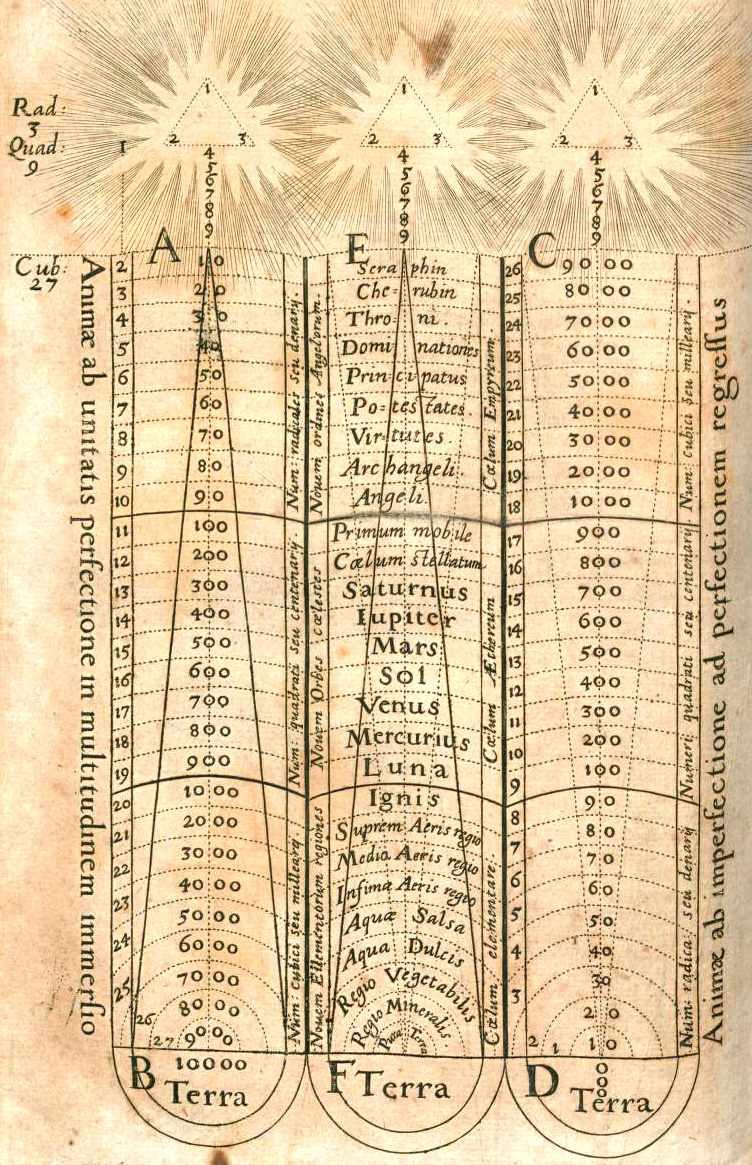Difference between revisions of "Meteorologica Cosmica"
Occultwiki (talk | contribs) |
Occultwiki (talk | contribs) |
||
| (One intermediate revision by the same user not shown) | |||
| Line 5: | Line 5: | ||
Fludd attempts to collect the sum total of meteorological knowledge of European scholars, but the text is hardly scientific in the traditional sense. It conflates comets with planets and meteors, and assigns all manner of religious and spiritual outcomes to various types of weather. The book contains a great deal of classification of natural phenomena, attempting to identify, define, and categorize virtually everything from wind to meteors. | Fludd attempts to collect the sum total of meteorological knowledge of European scholars, but the text is hardly scientific in the traditional sense. It conflates comets with planets and meteors, and assigns all manner of religious and spiritual outcomes to various types of weather. The book contains a great deal of classification of natural phenomena, attempting to identify, define, and categorize virtually everything from wind to meteors. | ||
A large engraving by Matthäus Merian displays a variety of cosmic phenomena influencing weather events on earth and their effect on human beings. This engraving shows the [[hierarchy of angels]] with each choir's leader, but also includes a tenth "choir" of the soul in the sphere of the elements. This choir is ruled over by the Soul of [[Jesus Christ]]. | A large engraving by Matthäus Merian displays a variety of cosmic phenomena influencing weather events on [[earth]] and their effect on human beings. This engraving shows the [[hierarchy of angels]] with each choir's leader, but also includes a tenth "choir" of the soul in the sphere of the elements. This choir is ruled over by the Soul of [[Jesus Christ]]. | ||
In categorizing good and bad forms of weather, Fludd states it is better to be scourged as a brief punishment than to be damned. He then assigns specific [[bible]] verses to specific events (for example, the wind is annotated with Exodus 15). | In categorizing good and bad forms of weather, Fludd states it is better to be scourged as a brief punishment than to be damned. He then assigns specific [[bible]] verses to specific events (for example, the wind is annotated with Exodus 15). | ||
On a separate diagram, Fludd demonstrates principles of the [[Kabbalah]], demonstrating that everything in heaven, in the skies, and on earth was created by [[Yahweh|Jehovah]]. The diagram includes the statement "I saw Jehovah sitting on the highest throne above the worldly palace lifted up like that palace was the full glory of the builder." | On a separate diagram, Fludd demonstrates principles of the [[Kabbalah]], demonstrating that everything in [[heaven]], in the skies, and on [[earth]] was created by [[Yahweh|Jehovah]]. The diagram includes the statement "I saw Jehovah sitting on the highest throne above the worldly palace lifted up like that palace was the full glory of the builder." | ||
==Publication== | ==Publication== | ||
Latest revision as of 17:31, 19 November 2024
Philosophia Sacra et Vere Christiana seu Meteorologia Cosmica more commonly called Meteorologia Cosmica, translated as Cosmic Meteorology is a 1623 grimoire by occultist Robert Fludd. The book deals with various forms of aerial phenomena, including the weather, astrology, and astronomical events.
Content
Fludd attempts to collect the sum total of meteorological knowledge of European scholars, but the text is hardly scientific in the traditional sense. It conflates comets with planets and meteors, and assigns all manner of religious and spiritual outcomes to various types of weather. The book contains a great deal of classification of natural phenomena, attempting to identify, define, and categorize virtually everything from wind to meteors.
A large engraving by Matthäus Merian displays a variety of cosmic phenomena influencing weather events on earth and their effect on human beings. This engraving shows the hierarchy of angels with each choir's leader, but also includes a tenth "choir" of the soul in the sphere of the elements. This choir is ruled over by the Soul of Jesus Christ.
In categorizing good and bad forms of weather, Fludd states it is better to be scourged as a brief punishment than to be damned. He then assigns specific bible verses to specific events (for example, the wind is annotated with Exodus 15).
On a separate diagram, Fludd demonstrates principles of the Kabbalah, demonstrating that everything in heaven, in the skies, and on earth was created by Jehovah. The diagram includes the statement "I saw Jehovah sitting on the highest throne above the worldly palace lifted up like that palace was the full glory of the builder."
Publication
Written in Latin, Meteorologia Cosmica was first published by Théodore de Bry in Frankfurt, Germany in 1623.
